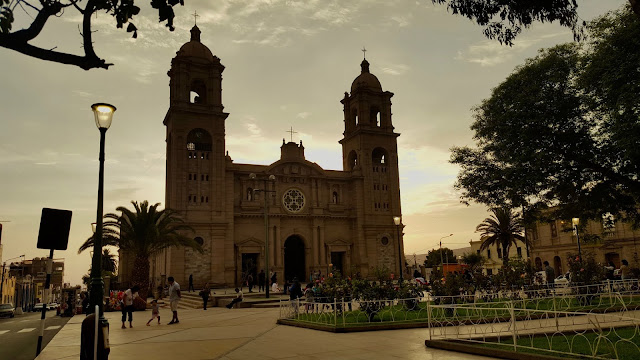At the Crossroads: Living Along the Border
Soldiers stop me twice as I walk the few blocks
of military housing. When the first soldier asks me where I am from and where I
am going, the question is so unexpected that I’m not sure what to respond, my
brain scrambling from English to Spanish as fast as it can. “I live here in Tacna… but I’m
walking to a meeting downtown?..” He lets me through. I greet the second
soldier and the interaction repeats itself. “Be careful out there,” he calls
after me, a phrase that rings strangely in my ears. There’s something off about
the way he says it but I can’t put my finger on it. They aren’t menacing or
angry and I’m not scared, just puzzled and a little unsettled. I have often cut
through this neighborhood and never received more than a “buenos días”. Then again,
the streets between the Chilean consulate and the military zone usually show
little-to-no signs of life. But something has changed: now there are tents and
groups of young adults gathered in circles. There are families with children
playing in the street. There is litter everywhere, caused by a large number of
people forced to live and sleep on the sidewalk and wait for news that is
torturously slow. These travelers are Venezuelan, waiting for news of their
migration process to Chile.
As I walk away from the second soldier, I
suddenly understand the awkward nature of our conversation: while I was simply
answering a question on my way to work, the soldier had mistaken me for a
Venezuelan migrant with no reason to be in this area. How could I not be? I
look different from many Peruvians with my blonde hair and foreign fashion, and
I’m walking through a zone overrun by foreigners. Last month I was confused for
a Chilena, now I’m a Venezolana, where will I be from next? I chuckle and shake
my head, reveling in the fact that after so much time spent living in this
country I still stick out like a sore thumb.
The next thought that comes hits me like a ton
of bricks: In this moment, I’m more focused on how my nationality is perceived
than I am for the well-being of the throngs of people I just passed by. I
suddenly understand that what I heard in the voice of the soldier was suspicion
and it shakes me out of my comfortable, easy existence here in Tacna, Peru.
With a knot in my stomach I am reminded that the experiences of others in this
border town are often vastly different than my own.
 |
| From here you can head into Tacna or take the Pan-American highway to Chile. |
I have become accustomed and even desensitized
to the Venezuelan migration. How many times have I looked out the window of a
bus or gone running in my neighborhood and witnessed migrants rolling their
suitcases down the Pan-American highway as they walk to the border? How many
times have I seen someone selling candy or chocolate, raising funds so as to
continue on their journey? These snapshots of migrants moving through the
bustling streets of Tacna have transformed from a rare occurrence to a part of
everyday life.
When the crisis began, Tacna welcomed the
arriving Venezuelans with open arms. But now, as the number of migrants
continues to grow we begin to close ourselves off, whether it be with feelings
of animosity or by ignoring their presence altogether.
As I walked by the crowds earlier, I did not
think to slow down, didn’t think to share the left-over lunch stored at the
bottom of my bag. I had been only half-observing the faces around me, my mind
on the meeting I had to get to and the lengthy to-do list for the weekend. I
did exactly the opposite of what I’ve been lecturing to my students; I didn’t
take the time to interact with the migrant situation that is happening in my
own streets, to hear the voices of “the other side”. Here I am, a Jesuit
Volunteer focused on social justice who completely missed a chance to live out
some of my goals: be a witness, interact with others, and experience empathy.
This is not a blog post about guilt or my
failure as a Jesuit Volunteer. However, this experience serves as a profound
reminder for me to take things slow, to stop a moment and witness what
is going on around me, and to interact with a stranger or two. Just as my
Peruvian friends and neighbors have cared for this quirky gringa and made her
feel right at home, I hope I can share a small part of the warmth and care that
I have received with others.
Through this experience I acknowledge that I may
not and cannot always be my best self. I may not always lead with an open and
giving heart. But I do know I will go out tomorrow and try again. I will stop
for a chat with someone. Maybe it will only be a smile. Maybe I’ll share my
lunch. Maybe I will only buy a candy bar for one sol. I’ll make mistakes
but I’ll try again tomorrow, and the next day. I hope that these newcomers may
too come to find a home in mi querida Tacna, Peru.



Camila, no sabes cuánto valoro y aprecio leer tus blogs. ¿Me darías permiso de compartir este blog con mi clase de español? Me parece muy acertado la forma como reflexionas acerca del tema de los refugiados. Me parece muy valioso para todos ver los sentimientos encontrados en cuanto al tema. Cada vez que uno de tus blogs, me dan ganas de llorar. Escribes de forma muy conmovedora y me hace pensar en mis propias actitudes. Gracias por compartir estas experiencias con todos nosotros.
ReplyDelete